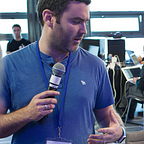Tech for Good in action for Inner City Helping Homeless
Human centred design and serverless development for a great cause
For the last few months engineers from Liberty IT have been building an app and website for the Inner City Helping Homeless (ICHH) charity for their volunteers to use. I’m writing about it now, not to blow our own trumpets, but to show others that it’s possible to use our technical skills for good, especially during these troubling times when a lot of us are going to have a lot more time on our hands at home.
The Inner City Helping Homeless charity is a remarkable one, whose volunteers head out late each night on the streets of Dublin to give food, clothes and information to the homeless; along with providing other services for homeless people during the daytime like advocation & assistance finding accommodation.
The development journey
We heard the ICHH CEO, Anthony Flynn speak at a Tech for Good Dublin event about how they had received a quote to build an app for their volunteers, for an amount they couldn’t afford. We offered to build one for free, then tried (as much as possible) to go about it like we would any other project:
- Human centred design principles
- Test in the field
- Iterative development
working closely with the ICHH’s Brian McLoughlin.
The human centred design approach is vital for any new solution — we met the management, then the volunteers themselves in a workshop, then we went out with them at night-time to observe them in action. It was then we felt confident in what would actually add value and could begin to build.
I occasionally meet people who want to develop free solutions for charities and I always advise them to really get to understand where they could add value and to not make assumptions, and not to build something without the charity’s deep involvement.
Likewise, once we built the first iteration we went out with them at night again to see them using it, and since it has launched we have sought regular feedback and are continuing to push changes.
The tech — native apps and serverless
The solution consists of an app, with separate native iOS and Android versions, and a serverless website & backend hosted on AWS. We went native mainly through personal choice, cross platform may make sense for enterprise teams but for engineers volunteering their time, whatever they’re most comfortable with makes sense.
The serverless approach, using services such as Route 53, Cloudfront, S3, API Gateway & Lambdas, has meant that the total cost of the infrastructure was $12 , yes $12! That was for a domain name for the website that we probably could have done without.
We worked on it in our spare time and with “Serve with Liberty” time, which is Liberty IT’s allocation for staff of time for socially good purposes, so the engineering cost was more or less zero — which is important to note as some companies may think this type of work will take up too much time or money.
What can you do?
We heard of a need and when we met the ICHH we realised what great work they do and we were only too happy to help. During the Coronavirus era we’re now in, the ICHH is still carrying out its work and we’re also continuing to support them them through updates to the apps and website — the fact we’re now all working remotely doesn’t impact us as we can push changes from wherever we are.
If you want to do something similar, now is a great time — you may have more time on your hands and there are plenty of charities that would love some engineering help. If you don’t know where to help, search on Twitter or LinkedIn or check with your networks and see what’s going on. Projects like Open Source Ventilator are already trying to help with the current crisis and there are likely many other ways engineers, designers and more can help.
More info on the Inner City Helping Homeless here: https://ichh.ie/
If you’ve any thoughts or comments, let me know below or you can get me on Twitter or LinkedIn. Thanks, Andy
